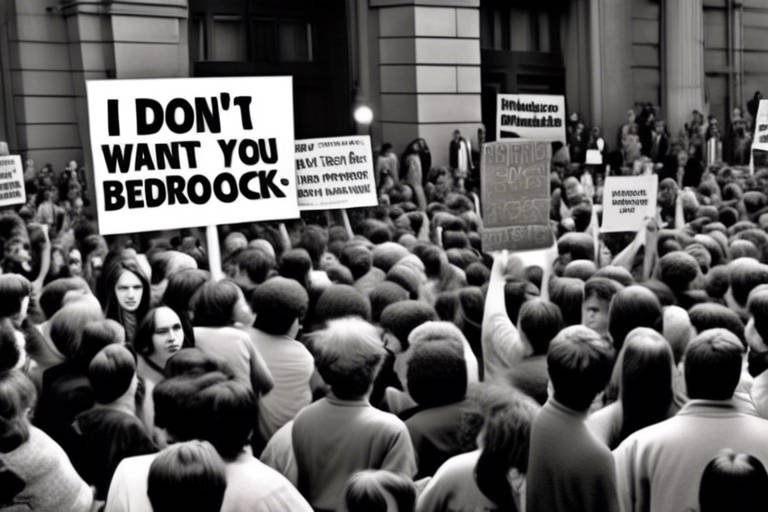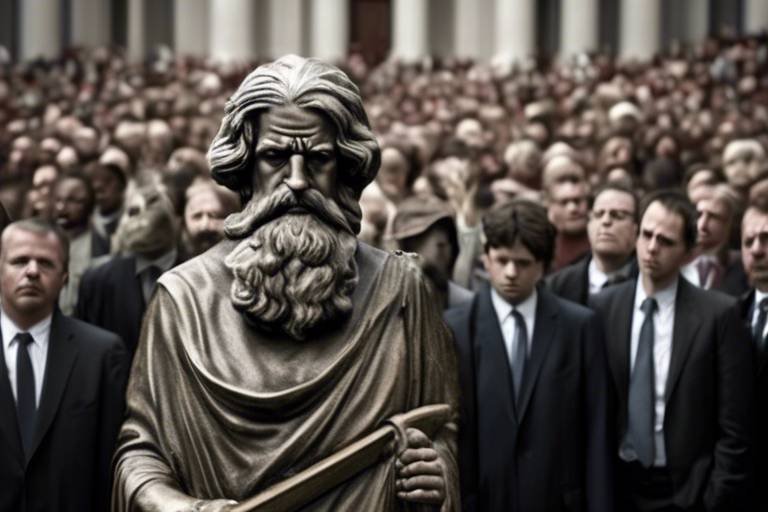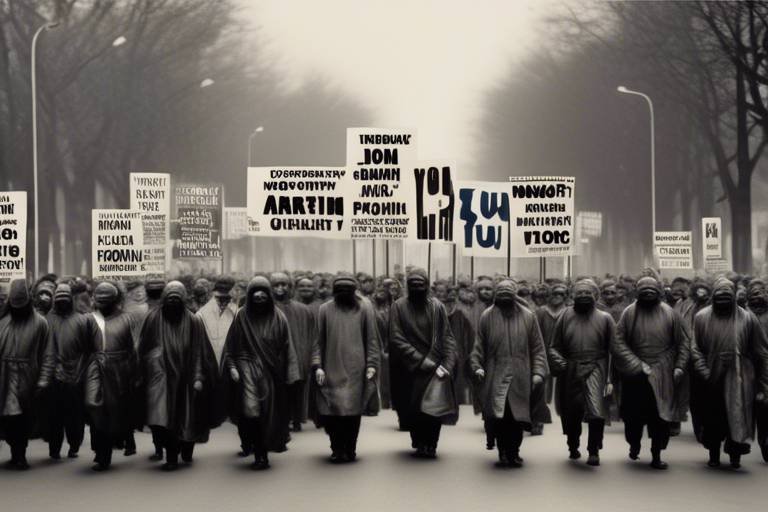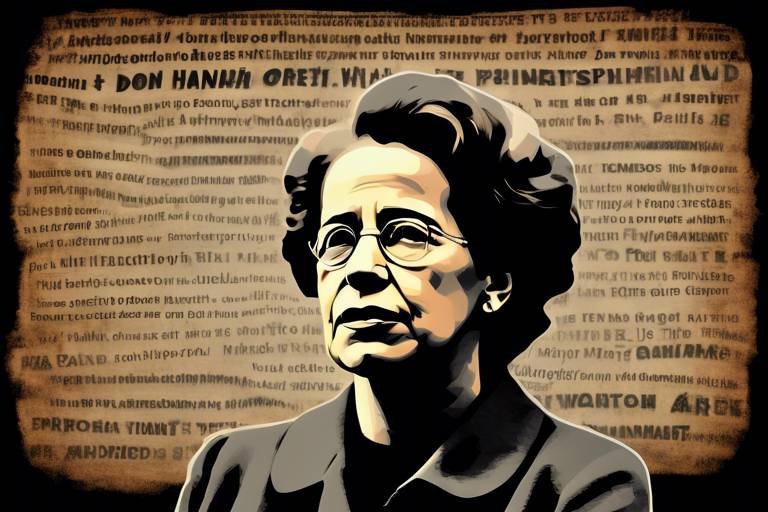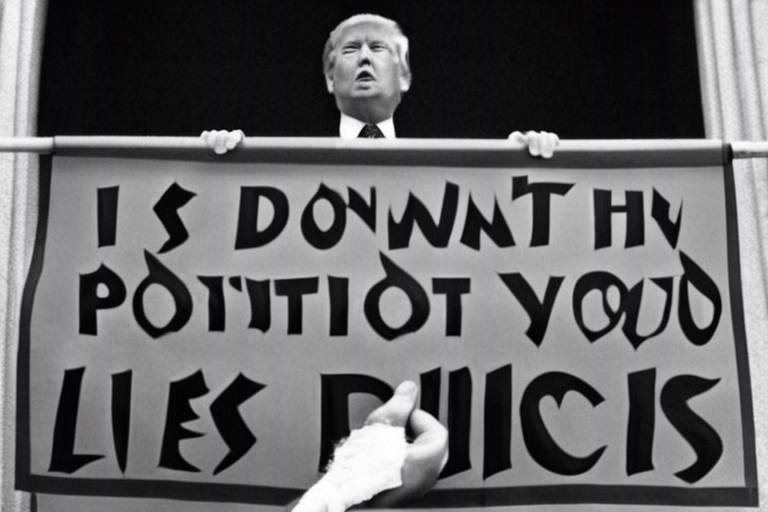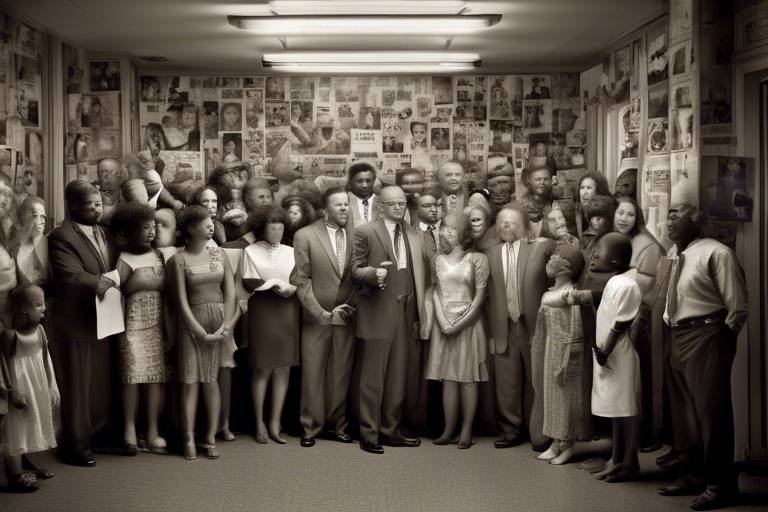Philosophy: The Bedrock of Political Activism
In a world where social injustices and political turmoil seem to be the norm, the role of philosophy cannot be overstated. It serves as the underlying framework that shapes our understanding of the world around us, especially in the realm of political activism. Imagine philosophy as the blueprint for a building; without it, the structure of activism would crumble under the weight of confusion and chaos. By delving into philosophical concepts, activists can articulate their goals, justify their actions, and connect with others who share their vision for a better society.
Throughout history, we have witnessed how philosophical ideas have ignited movements, fueled revolutions, and inspired individuals to challenge the status quo. From the ancient Greeks to modern thinkers, the exploration of justice, freedom, and equality has provided activists with the tools they need to advocate for change. When activists understand the philosophical underpinnings of their cause, they can engage in more meaningful dialogues, craft persuasive arguments, and mobilize communities effectively. This article will explore the foundational role of philosophy in shaping political activism, examining key concepts, influential thinkers, and the dynamic interplay between philosophical ideas and social movements throughout history.
The beauty of philosophy lies in its ability to provoke thought and foster critical analysis. It encourages individuals to ask profound questions, such as: What does it mean to live in a just society? How do we define freedom, and who gets to decide who is free? These questions are not merely academic; they are the lifeblood of activism. When activists grapple with these concepts, they are better equipped to challenge oppressive systems and advocate for the rights of marginalized communities.
Moreover, philosophy invites us to reflect on our moral responsibilities. In a time when misinformation spreads like wildfire, the ethical implications of our beliefs and actions become crucial. Activists must navigate the murky waters of ethical dilemmas, weighing the consequences of their choices. Here, philosophy acts as a compass, guiding them toward decisions that align with their values and the greater good.
As we dive deeper into the relationship between philosophy and activism, we will uncover various key philosophical concepts that are vital for understanding and engaging in social change. The interplay between these ideas and the actions of activists creates a rich tapestry of thought and action, illustrating that philosophy is not just a theoretical exercise but a practical tool for transformation.
Philosophy provides the theoretical framework for political activism, offering insights into justice, rights, and ethics that guide activists in their pursuit of social change and moral responsibility. Without this foundational understanding, activism can become reactive rather than proactive, lacking a clear direction or purpose. By grounding their efforts in philosophical thought, activists can articulate their vision for a just society, making their movements more coherent and compelling.
- What is the relationship between philosophy and political activism?
Philosophy provides the conceptual framework that helps activists understand and articulate their goals, enabling them to engage in more effective advocacy. - How can philosophical concepts like justice and freedom influence activism?
These concepts help activists frame their arguments, justify their actions, and connect with a broader audience who share similar values. - Who are some influential philosophers in the realm of activism?
Thinkers like John Stuart Mill and Frantz Fanon have profoundly impacted social movements, providing insights that continue to inspire activists today.

The Role of Philosophy in Activism
Philosophy serves as the theoretical backbone of political activism, providing the essential insights and frameworks that guide activists in their quest for social change. Imagine trying to navigate a dense forest without a map—this is akin to activism without philosophy. It is philosophy that illuminates the path, helping activists to discern what is just, ethical, and necessary in their efforts to influence society. By engaging with philosophical ideas, activists can articulate their goals more clearly and understand the moral implications of their actions.
At its core, philosophy encourages critical thinking and reflection, pushing activists to question not just the status quo but also the very principles that underpin their beliefs. For example, when activists advocate for civil rights, they are not merely demanding change; they are invoking a deeper understanding of justice and equality that has been debated and refined over centuries. This philosophical grounding enables them to build compelling arguments and mobilize support from a broader audience.
Moreover, philosophy helps activists to navigate the often murky waters of ethics. Consider the ethical dilemmas faced by activists who must choose between various strategies to achieve their goals. Should they prioritize nonviolent resistance or consider more radical measures? Philosophy provides the tools to weigh these options thoughtfully, considering the potential outcomes and moral ramifications of each choice. This kind of ethical reasoning is crucial, as it not only shapes the strategies employed but also influences public perception and support.
Additionally, philosophical discourse can foster a sense of community among activists. When individuals come together to discuss and debate philosophical concepts, they create a shared language and understanding that strengthens their collective identity. This sense of unity can be incredibly powerful, especially in movements that seek to challenge systemic injustices. By grounding their activism in shared philosophical principles, activists can rally around common goals and inspire others to join their cause.
In summary, the role of philosophy in activism is multifaceted. It provides a framework for understanding justice, guides ethical decision-making, and fosters community among activists. As we delve deeper into the key concepts of philosophy that inform activism, we will see how these ideas not only shape individual movements but also resonate across time and cultures, continually inspiring new generations to fight for a better world.
- Why is philosophy important in activism? Philosophy offers the theoretical foundation that helps activists articulate their goals, navigate ethical dilemmas, and foster a sense of community.
- How do philosophical concepts influence activism? Concepts like justice, equality, and freedom shape the arguments and strategies activists use to effect social change.
- Can philosophy help in decision-making for activists? Yes, philosophical reasoning aids activists in weighing the moral implications of their strategies and actions.
- What role do historical philosophers play in modern activism? Historical philosophers provide insights and frameworks that continue to inspire contemporary movements for social justice and human rights.

Key Philosophical Concepts
When it comes to political activism, understanding key philosophical concepts is like having a map in uncharted territory. These ideas not only shape the arguments activists make but also inform the strategies they employ in their quest for social change. Among the most pivotal concepts are justice, equality, and freedom. Each of these notions plays a critical role in how activists perceive their goals and the societal structures they aim to transform.
Let’s dive deeper into these concepts. First up is justice. It's not just a buzzword; it's a multifaceted idea that influences how activists define their objectives. The interpretations of justice can vary widely, but they generally fall into two categories: distributive justice and retributive justice. Distributive justice involves the fair allocation of resources, opportunities, and privileges within a society. Activists often leverage this concept to advocate for policies that combat economic inequality. For instance, when discussing wealth distribution, activists might argue for progressive taxation or social welfare programs aimed at leveling the playing field.
On the flip side, we have retributive justice, which focuses on punishment and accountability for wrongdoing. This perspective is crucial for activists working within the criminal justice system, pushing for reforms that address systemic biases and promote fair treatment for all individuals, regardless of their background. But what does this mean in practice? It means that activists are not just fighting against injustices; they are also proposing solutions that aim to rectify these wrongs.
Next, let’s explore the concept of equality. This is a foundational pillar for many social movements, from civil rights to gender equality. Activists often argue that equality is not merely about sameness but about ensuring that every individual has access to the same opportunities and resources. This idea can manifest in various forms, such as advocating for equal pay for equal work or fighting against discriminatory practices in hiring. The push for equality is a continuous journey, one that requires constant vigilance and active participation from all members of society.
Finally, we can’t overlook freedom and autonomy. These concepts are not just philosophical musings; they are the lifeblood of political movements. Activists interpret freedom in various ways, often emphasizing the importance of individual rights and collective liberation. For example, movements advocating for LGBTQ+ rights center their arguments around the freedom to love and express oneself without fear of persecution. Similarly, environmental activists argue for the freedom of future generations to inherit a healthy planet, advocating for sustainable practices that protect the earth.
In summary, key philosophical concepts like justice, equality, and freedom serve as the bedrock for political activism. They provide the language and framework for activists to articulate their goals and rally support. Understanding these ideas is not just for philosophers; it's essential for anyone who wants to be an effective advocate for change. As we navigate the complexities of social movements, these concepts will continue to guide and inspire us.
- What is the role of philosophy in political activism?
Philosophy provides the theoretical foundation for activism, offering insights into justice, rights, and ethics that guide activists in their efforts for social change. - Why are concepts like justice and equality important for activists?
These concepts help activists frame their arguments and strategies, ensuring that their pursuits for change are grounded in well-defined principles. - How can understanding these concepts improve activism?
By grasping key philosophical ideas, activists can communicate their goals more effectively and build stronger coalitions with others who share similar values.

Justice and Its Implications
When we think about justice, it’s not just a word—it’s a concept that shapes our understanding of the world and our place in it. Justice serves as the backbone of political activism, guiding how activists frame their goals and assess the fairness of societal structures. But what does justice really mean in the context of activism? Is it merely about punishing the wrongdoers, or is it about creating a more equitable society? These questions are crucial as they help define the very essence of social movements.
To dive deeper, we can categorize justice into several interpretations, each with its own implications for activism. For instance, consider the distinction between distributive justice and retributive justice. Distributive justice focuses on the fair allocation of resources and opportunities. Activists who embrace this concept often advocate for policies that aim to reduce economic inequality and address social disparities. They argue that a just society is one where resources are distributed based on need rather than privilege. This perspective is often illustrated in movements that fight for universal healthcare, affordable housing, and equal education.
On the other hand, retributive justice emphasizes punishment and retribution. This view can lead to a cycle of vengeance and does not necessarily address the root causes of crime or inequality. Activists advocating for this form of justice often focus on reforming the criminal justice system, demanding harsher penalties for offenders. However, this approach can sometimes overlook the broader societal issues that lead to crime in the first place, such as poverty and lack of access to education.
Another vital aspect of justice is restorative justice, which seeks to heal rather than punish. This philosophy promotes reconciliation and aims to repair the harm caused by criminal behavior. Activists advocating for restorative justice often work within communities to develop practices that foster healing and understanding between victims and offenders. This approach can be transformative, leading to a more humane response to societal issues and encouraging community involvement in the justice process.
Ultimately, the implications of justice in activism are profound. How activists interpret justice can significantly influence their strategies and the outcomes they pursue. By understanding these different dimensions of justice, activists can craft more effective arguments and mobilize support for their causes. In essence, justice is not merely an abstract idea; it is a powerful tool that can catalyze social change and inspire collective action.
- What is the difference between distributive and retributive justice?
Distributive justice focuses on the fair distribution of resources and opportunities, while retributive justice emphasizes punishment for wrongdoing. - How does restorative justice work?
Restorative justice seeks to repair harm through reconciliation between victims and offenders, promoting healing rather than punishment. - Why is understanding justice important for activists?
Understanding justice helps activists frame their goals and strategies effectively, addressing the root causes of social issues.

Distributive Justice
Distributive justice is a powerful concept that revolves around the fair allocation of resources, opportunities, and privileges within society. Imagine a large pie, where each slice represents wealth, education, healthcare, and other essential resources. The question that arises is: who gets what slice, and how big should each slice be? This is where the philosophical debate on distributive justice becomes crucial. Activists often leverage this concept to advocate for policies that aim to reduce economic inequality and address the social disparities that plague our communities.
At its core, distributive justice seeks to answer fundamental questions about fairness and equity. Different philosophical frameworks approach these questions in various ways. For instance, some argue that resources should be distributed based on need, while others believe that merit or contribution to society should dictate allocation. This divergence of thought can lead to passionate debates among activists and policymakers alike. Regardless of the approach, the goal remains the same: to create a more just society where everyone has access to the resources they need to thrive.
Activists often reference key theories of distributive justice to bolster their arguments. Here are a few prominent theories:
- Utilitarianism: This theory suggests that resources should be distributed in a way that maximizes overall happiness. In this view, policies that benefit the majority, even at the expense of a few, can be justified.
- Rawlsian Justice: Philosopher John Rawls proposed that a fair distribution of resources should be determined by principles chosen behind a "veil of ignorance," where decision-makers do not know their own social status. This approach emphasizes fairness and equality.
- Libertarianism: This perspective values individual rights and property ownership, arguing that resources should be distributed based on voluntary exchanges and personal responsibility.
These theories reflect the complexity of distributive justice and highlight the importance of philosophical inquiry in activism. Activists utilize these frameworks to advocate for various social policies, such as progressive taxation, universal healthcare, and education reform. By grounding their arguments in established philosophical thought, they can effectively challenge existing power structures and push for meaningful change.
Moreover, the implications of distributive justice extend beyond economic concerns. They touch upon issues of race, gender, and environmental justice. For example, in the context of climate change, activists argue that those who have contributed the least to environmental degradation often suffer the most from its effects. This perspective calls for a distribution of resources that prioritizes the needs of marginalized communities, ensuring that they receive the support necessary to adapt and thrive.
In conclusion, distributive justice serves as a crucial pillar for activists striving to create a more equitable society. By understanding and applying its principles, activists can better articulate their goals and engage in meaningful dialogues about fairness and resource allocation. As we continue to grapple with social inequalities, the philosophical underpinnings of distributive justice will remain vital in shaping our collective efforts toward a just future.
- What is distributive justice? Distributive justice refers to the fair allocation of resources and opportunities within society, addressing how wealth and privileges should be distributed among individuals and groups.
- Why is distributive justice important for activism? It provides a framework for understanding and advocating for policies that aim to reduce inequality and promote fairness in society.
- What are some theories of distributive justice? Key theories include utilitarianism, Rawlsian justice, and libertarianism, each offering different perspectives on how resources should be allocated.

Restorative Justice
Restorative justice is a transformative approach that shifts the focus from punishment to healing and reconciliation. Imagine a community where instead of merely doling out sentences, we actively seek to mend the fabric of relationships torn apart by crime or conflict. This philosophy emphasizes restoration rather than retribution, advocating for a more humane and constructive response to wrongdoing. It invites all parties involved—victims, offenders, and the community—to engage in dialogue, fostering understanding and empathy.
At its core, restorative justice is about addressing the harm caused by an offense and finding ways to make amends. This approach can be particularly effective in various contexts, such as schools, neighborhoods, and even within the criminal justice system. By prioritizing healing over punishment, restorative justice paves the way for personal accountability and societal reintegration. It encourages offenders to take responsibility for their actions while providing victims with a voice in the resolution process.
One of the key elements of restorative justice is the circle process, where participants come together in a safe space to share their feelings and perspectives. This method not only empowers victims to express their hurt but also allows offenders to understand the impact of their actions. The goal is to foster a sense of community and collaboration, leading to solutions that are satisfactory for all involved. In this way, restorative justice can serve as a powerful tool for social change, challenging traditional punitive systems that often exacerbate cycles of violence and alienation.
Moreover, restorative justice has profound implications for social activism. Activists often advocate for its adoption in various sectors, highlighting its potential to create a more equitable and compassionate society. By implementing restorative practices, communities can address issues like racial injustice, economic disparity, and systemic oppression in a way that fosters healing rather than division. This philosophy aligns with the broader goals of many social movements, which seek to dismantle harmful structures and promote inclusivity.
Ultimately, restorative justice challenges us to rethink our approach to conflict and wrongdoing. It asks us to consider: what does it mean to truly heal? How can we create spaces where everyone feels valued and heard? By embracing restorative principles, we can cultivate a culture of compassion and understanding, paving the way for a more just world.
- What is restorative justice? Restorative justice is an approach that focuses on healing and reconciliation rather than punishment, involving all parties affected by an offense.
- How does restorative justice work? It typically involves dialogue among victims, offenders, and community members to address the harm caused and find ways to make amends.
- What are the benefits of restorative justice? Benefits include healing for victims, accountability for offenders, and stronger community ties, often leading to reduced recidivism rates.
- In what contexts can restorative justice be applied? Restorative justice can be applied in schools, neighborhoods, and the criminal justice system, among other areas.

Freedom and Autonomy
When we talk about freedom and autonomy, we delve into the very heart of what it means to be human. These concepts are not just abstract ideas; they are the driving forces behind many political movements and social changes throughout history. Imagine living in a world where your choices are dictated by others, where your voice is silenced, and your rights are trampled upon. It’s a nightmare scenario, isn’t it? This is why activists cling to the notions of freedom and autonomy as essential pillars in their fight for justice.
Freedom is often viewed as the absence of constraints—being able to act, speak, or think without hindrance. However, it’s essential to recognize that freedom is not just about personal liberty; it also encompasses the collective rights of communities. Activists argue that true freedom involves the ability to participate in societal decisions that affect one’s life. This perspective aligns with the idea of autonomy, which emphasizes self-governance and the capacity to make informed choices. Autonomy allows individuals to have agency over their lives, enabling them to pursue their dreams and aspirations without undue interference.
Throughout history, various movements have highlighted the importance of these concepts. For instance, the civil rights movement in the United States was fundamentally about claiming freedom from oppression and asserting the autonomy of African Americans. Activists like Martin Luther King Jr. championed the idea that everyone deserves the right to live freely and with dignity. Similarly, the feminist movement has fought tirelessly for women's autonomy, advocating for their rights to make choices about their bodies and lives.
To better understand how freedom and autonomy manifest in activism, let’s consider a few key aspects:
- Individual Rights: Activists argue that every person should have the right to express themselves, pursue their interests, and live without fear of discrimination.
- Collective Liberation: The struggle for freedom is not just an individual endeavor; it’s also about uplifting entire communities. Activists work to dismantle systemic barriers that inhibit the autonomy of marginalized groups.
- Empowerment: By advocating for freedom and autonomy, activists aim to empower individuals to take control of their lives and advocate for their rights.
In essence, the interplay between freedom and autonomy is crucial for any activist striving for change. These concepts not only fuel the passion behind movements but also provide a framework for understanding the rights and responsibilities that come with being part of a society. The fight for freedom is ongoing, and as new challenges arise, activists must continually redefine what these terms mean in the context of their struggles.
Q: What is the difference between freedom and autonomy?
A: Freedom generally refers to the absence of constraints and the ability to act independently, while autonomy emphasizes self-governance and the capacity to make informed choices about one's own life.
Q: How do freedom and autonomy relate to social movements?
A: These concepts are foundational to many social movements, as they advocate for individuals and communities to have the right to make decisions that affect their lives and to live without oppression.
Q: Can freedom exist without autonomy?
A: While freedom can exist in a limited form without autonomy, true freedom is often understood as encompassing both personal liberty and the ability to make autonomous choices.
Q: How can I support movements that promote freedom and autonomy?
A: You can support these movements by educating yourself about their goals, participating in advocacy efforts, and amplifying the voices of marginalized communities.

Influential Philosophers in Activism
Throughout history, numerous philosophers have played a pivotal role in shaping political activism, acting as the intellectual backbone for various movements seeking social justice and human rights. These thinkers have not only challenged the status quo but have also provided the necessary frameworks for understanding oppression and envisioning a more equitable society. Their ideas serve as guiding lights for activists, illuminating paths toward change and inspiring generations to take action.
One of the most significant figures in this realm is John Stuart Mill, whose advocacy for individual liberty and utilitarianism has profoundly influenced modern activism. Mill argued that the freedom of individuals should be protected against societal tyranny. His compelling arguments for freedom of expression and social progress continue to resonate with contemporary movements, encouraging activists to advocate for their rights and the rights of others. Mill believed that society flourishes when individuals are free to pursue their own happiness, provided they do not harm others in the process. This idea not only empowers individuals but also fosters a sense of community responsibility, making it a cornerstone for many social justice movements today.
Another pivotal figure is Frantz Fanon, whose work on colonialism and liberation has inspired anti-colonial movements across the globe. Fanon’s philosophical insights into identity, race, and resistance are crucial for understanding struggles against oppression. He argued that colonialism dehumanizes both the colonized and the colonizers, creating a cycle of violence and alienation. By emphasizing the need for psychological liberation alongside physical emancipation, Fanon’s ideas have motivated activists to seek holistic approaches to freedom. His famous assertion that "the oppressed must rise up" serves as a rallying cry for those fighting against systemic injustices.
Additionally, the contributions of philosophers like Simone de Beauvoir and Martin Luther King Jr. cannot be overlooked. De Beauvoir's existentialist views on gender and oppression laid the groundwork for feminist activism, arguing that one is not born a woman but becomes one through societal constructs. This perspective has empowered countless individuals to challenge gender norms and advocate for women's rights. Similarly, King’s philosophy of nonviolent resistance and love as a powerful tool for change has inspired movements for civil rights and social justice worldwide. His belief that "injustice anywhere is a threat to justice everywhere" highlights the interconnectedness of struggles, urging activists to unite across different causes.
To summarize the contributions of these influential philosophers, the table below highlights their key ideas and the movements they inspired:
| Philosopher | Key Ideas | Influenced Movements |
|---|---|---|
| John Stuart Mill | Individual liberty, utilitarianism, freedom of expression | Modern civil rights movements |
| Frantz Fanon | Colonialism, identity, psychological liberation | Anti-colonial movements |
| Simone de Beauvoir | Existentialism, gender constructs | Feminist movements |
| Martin Luther King Jr. | Nonviolent resistance, love, interconnectedness of justice | Civil rights movements |
These philosophers not only shaped the thought processes of activists but also provided the moral and ethical frameworks necessary for advocating change. Their ideas continue to inspire new generations, reminding us that the quest for justice is a journey fueled by both thought and action. As we reflect on their contributions, we must ask ourselves: how can we apply these philosophical insights to our own activism today? The answers lie in our willingness to engage with these ideas, challenge our own beliefs, and stand up for what is right.
- Why is philosophy important in activism? Philosophy provides the foundational ideas that guide activists in their pursuit of justice and social change, helping them articulate their goals and strategies effectively.
- Who are some key philosophers that have influenced activism? Notable philosophers include John Stuart Mill, Frantz Fanon, Simone de Beauvoir, and Martin Luther King Jr., each contributing unique perspectives that have shaped various movements.
- How can I apply philosophical concepts to my activism? By understanding key philosophical ideas such as justice, freedom, and equality, you can develop a more nuanced approach to activism that addresses the complexities of social issues.

John Stuart Mill
John Stuart Mill was not just a philosopher; he was a beacon of thought who illuminated the path for countless activists seeking to challenge the status quo. His profound belief in individual liberty and the principles of utilitarianism have left an indelible mark on the landscape of political activism. Mill argued that the best society is one where individuals are free to pursue their own happiness, as long as their actions do not harm others. This idea is pivotal for activists who strive for a world where personal freedoms are respected and protected.
One of Mill's most influential contributions is his staunch defense of freedom of expression. He believed that all ideas, even those that are unpopular or controversial, should be expressed and debated openly. This philosophy underpins many modern movements advocating for human rights and social justice. Mill famously stated, "He who knows only his own side of the case knows little of that." This assertion encourages activists to engage in dialogue and understand opposing viewpoints, fostering a more inclusive and comprehensive approach to activism.
Furthermore, Mill's ideas on social progress resonate deeply with contemporary movements. He envisioned a society that evolves through the collective pursuit of knowledge and understanding. This notion of progress is not merely linear; it is a dynamic interplay of ideas where activists can learn from past struggles and adapt their strategies for future success. Mill's emphasis on education and critical thinking as tools for societal improvement remains relevant today, urging activists to be well-informed and articulate in their advocacy.
To illustrate Mill's impact on activism, consider the following table that highlights key aspects of his philosophy:
| Philosophical Concept | Description | Activist Application |
|---|---|---|
| Individual Liberty | The right of individuals to act as they choose, provided they do not harm others. | Advocating for civil rights and personal freedoms. |
| Utilitarianism | The ethical theory that promotes actions that maximize happiness and well-being. | Guiding policies that aim to improve the overall welfare of society. |
| Freedom of Expression | The belief that all ideas should be freely expressed and debated. | Supporting free speech movements and opposing censorship. |
| Social Progress | The idea that society can improve through the pursuit of knowledge and understanding. | Encouraging education and awareness campaigns. |
In summary, John Stuart Mill's philosophy serves as a foundation for many modern activist movements. His insights on liberty, expression, and progress not only challenge us to think critically but also inspire us to act courageously in the face of injustice. By embracing Mill's teachings, activists can equip themselves with the intellectual tools needed to advocate for a more just and equitable society.
- What is John Stuart Mill known for? Mill is known for his contributions to liberal thought, particularly his ideas on individual liberty, utilitarianism, and freedom of expression.
- How did Mill influence political activism? Mill's philosophy encourages open dialogue and critical thinking, which are essential for effective activism.
- What is the significance of freedom of expression in activism? Freedom of expression allows activists to voice their opinions, challenge injustices, and foster a culture of debate and understanding.
- Can Mill's ideas be applied to modern social movements? Absolutely! Mill's concepts of liberty and social progress are highly relevant to contemporary movements advocating for human rights and social justice.

Frantz Fanon
Frantz Fanon was not just a philosopher; he was a revolutionary thinker whose ideas ignited the flames of resistance against colonialism and oppression. Born in Martinique in 1925, Fanon’s life was a tapestry woven with the threads of struggle, identity, and liberation. His profound understanding of the psychological effects of colonization and his passionate advocacy for the rights of the oppressed have made him a cornerstone in the realm of political activism.
Fanon's seminal works, such as The Wretched of the Earth and Black Skin, White Masks, delve deep into the complexities of identity and the impact of colonialism on the human psyche. In these texts, he articulates the anguish of the colonized, exploring how colonial domination strips away individuality and fosters a sense of alienation. He famously stated, “The colonized can see the colonizer, but the colonizer cannot see the colonized.” This quote encapsulates the essence of his argument: the need for the colonized to reclaim their identity and assert their humanity.
Fanon's philosophy emphasizes the importance of violence as a means of liberation. He believed that in order to dismantle the oppressive structures of colonialism, the oppressed must engage in a struggle that is both physical and psychological. For Fanon, violence was not an end in itself but a necessary step towards achieving true freedom. This perspective has sparked intense debates among activists and scholars alike, raising questions about the morality and effectiveness of violent resistance. Nevertheless, his ideas have inspired countless movements around the globe, from the Algerian War of Independence to contemporary struggles against systemic racism.
Moreover, Fanon’s thoughts on racial identity and solidarity are particularly relevant today. He argued that the fight against colonialism is not merely a political struggle but also a cultural one. To Fanon, reclaiming cultural identity was essential for the psychological liberation of colonized peoples. He posited that understanding one's roots and heritage could empower individuals to resist oppression. This notion resonates strongly with modern movements advocating for racial justice and equality, as activists draw upon Fanon's insights to challenge systemic racism and advocate for the recognition of diverse identities.
Fanon's legacy continues to inspire activists, scholars, and thinkers across the globe. His call for solidarity among oppressed peoples underscores the importance of unity in the fight against injustice. By emphasizing the interconnectedness of struggles, Fanon encourages activists to recognize that liberation is not solely a local issue but a global imperative. His philosophy serves as a reminder that the fight for justice transcends borders and that the struggles of one community are intimately linked to the struggles of all marginalized groups.
In summary, Frantz Fanon's contributions to political activism are invaluable. His insights into the psychological effects of colonialism, the necessity of violence in the struggle for liberation, and the importance of cultural identity have shaped modern understandings of resistance. As we navigate the complexities of contemporary social movements, Fanon's philosophy serves as a guiding light, urging us to confront oppression with courage and solidarity.
- What is Frantz Fanon's most famous work?
Fanon's most famous works include The Wretched of the Earth and Black Skin, White Masks, both of which explore themes of colonialism, identity, and liberation.
- How did Fanon's work influence modern activism?
Fanon's ideas on violence, identity, and solidarity have inspired various movements for social justice and human rights, emphasizing the importance of cultural reclamation and collective struggle.
- What role does violence play in Fanon's philosophy?
Fanon viewed violence as a necessary means of achieving liberation from colonial oppression, arguing that it serves both a physical and psychological purpose in the struggle for freedom.
Frequently Asked Questions
- What is the relationship between philosophy and political activism?
Philosophy serves as the backbone of political activism by providing the theoretical framework that guides activists in their pursuit of social change. It helps them understand key concepts like justice, rights, and ethics, which are essential for formulating arguments and strategies aimed at transforming society.
- Why are concepts like justice and equality important for activists?
Justice and equality are crucial for activists because they form the foundation of their goals and objectives. By understanding these concepts, activists can better articulate their demands and evaluate the fairness of existing social systems. This understanding empowers them to challenge inequalities and advocate for a more just society.
- How does distributive justice influence activism?
Distributive justice focuses on the fair allocation of resources and opportunities. Activists often leverage this concept to push for policies that address economic disparities and social inequalities, advocating for a more equitable distribution of wealth and resources in society.
- What is restorative justice, and how is it applied in activism?
Restorative justice emphasizes healing and reconciliation rather than punishment. Activists utilize this philosophy to promote restorative practices in areas like criminal justice and community conflicts, aiming to create a more humane approach to societal issues by focusing on restoring relationships and addressing the root causes of harm.
- How do freedom and autonomy shape political movements?
The ideas of freedom and autonomy are vital for activists as they advocate for individual rights and collective liberation. Activists interpret these concepts to challenge oppressive systems, emphasizing the importance of personal liberty and the right to self-determination in their movements.
- Which philosophers have significantly influenced political activism?
Several philosophers have had a profound impact on political activism, including John Stuart Mill and Frantz Fanon. Mill's ideas on individual liberty and utilitarianism resonate with modern movements, while Fanon's insights into colonialism and race have inspired anti-colonial struggles worldwide, making their philosophies essential for understanding activism today.

